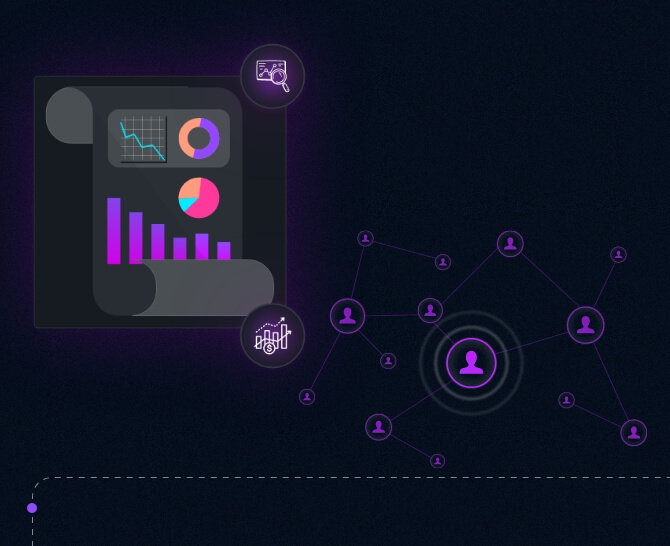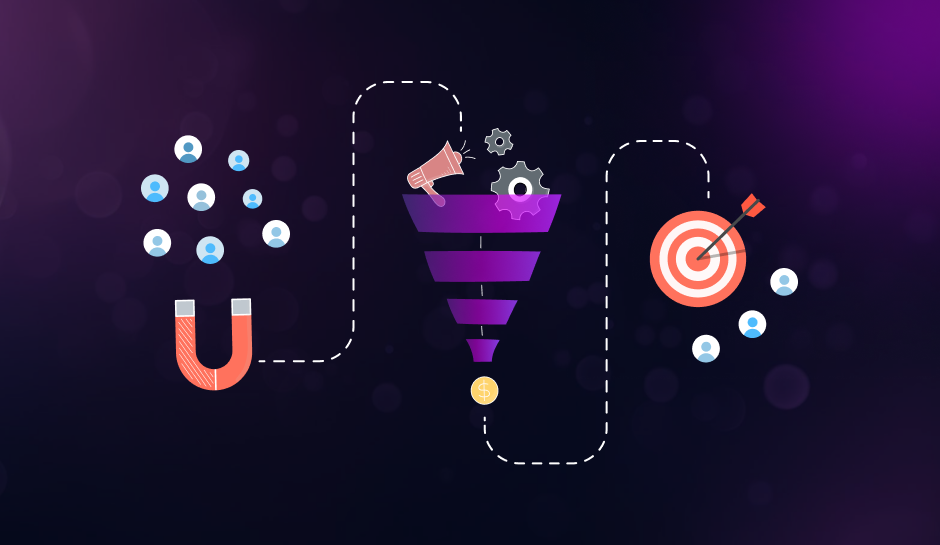
Do you take customer loyalty for granted? Think again, as a recent PWC study highlighted that 32% of customers turn their back on a brand they loved after a single bad experience. One bad experience is all it takes for a business to lose a third of its loyal customers! The question arises – how does a business stop this attrition? The answer lies in tracking and studying the customer journey and improving it.
It is easier said than done. Despite having access to various data and analytics tools, marketers struggle to track the customer journey and understand customer behavior effectively. The inability to create a customer journey strategy can result in missed customer engagement and retention opportunities. In this detailed write-up, we talk about the importance of customer journey tracking and how marketers can approach it.
What is a Customer Journey?
Before further delving into tracking customer journeys, let us address the elephant in the room – what is a customer journey? It refers to the customer’s interaction with a business through various touchpoints – from initial awareness to post-purchase evaluation. It is the entire end-to-end experience a customer has with a brand or product, and it can include both online and offline interactions. In a competitive ecosystem, brands must map this journey to understand the customer’s experience across different touchpoints and identify improvement opportunities.
For example, a customer may have discovered your brand name and product on social media. Curious about the product, the customer may have watched a product video on YouTube. It may have triggered an interest in your product, and to validate the USPs, they may read blogs on the product and customer reviews. In the next step, the customer may buy the product in your store or a marketplace like Amazon. The customer finally receives the product and leaves a review at your store or on social media platforms. This entire process, from awareness to purchase and post-purchase evaluation, is called CUSTOMER JOURNEY.
What Is Customer Journey Tracking?
Now that you know the customer journey, you must have strategies to track it. Customer journey tracking analyzes and understands the various interactions and touchpoints a customer has with your brand. It includes all the stages, from initial awareness to post-purchase evaluation. To establish an extensive perspective on your customer’s journey, you must collect a wide range of customer data, including their behavior and preferences at each stage. Using this data, you can improve the overall customer experience and increase customer satisfaction. Here are some of the important tools for your customer journey strategy.
- Website Analytics
- Social Media Monitoring
- Customer Surveys
- Customer Service Interactions
By analyzing website traffic data, you can track how customers find your site, what pages they visit, and how long they spend on each page. With this information you can optimize your website and content to engage with visitors actively and turn them into paying customers.
Social media has become the most fruitful engagement platform for businesses and their customers. You must track social media conversations and engagements to understand how customers talk about your brand, what they like and dislike, and what problems they may be experiencing. This information helps you streamline your social media strategies for higher engagement and responding to customer feedback.
By collecting customer feedback at various stages of their journey, you can gain valuable insights into improving the customer experience. For example, you can initiate a survey once a customer purchases your product to know how satisfied they are with the product and their overall buying experience. It also establishes your reputation as a brand that cares for its customers post-purchase.
Tracking customer service interactions, such as phone calls or chat conversations, can help you identify common problems and pain points that customers may be experiencing. This information can help improve customer service processes and provide better support to customers in the future.
Why Is Customer Journey Tracking Important?
In an era where customers have a wide choice of products and services, tracking journeys and improving experience has become a market differentiator. In a tech-savvy world where businesses interact with customers using different touchpoints, customer journey tracking allows them to understand their customer’s path from awareness to purchase and beyond. It gives you a comprehensive view of the customer experience and intelligence on improving them.
Airbnb is a good case story of how it uses customer journey tracking to gain insights and improve its customer offering. By analyzing data from multiple touchpoints, such as website clicks, bookings, and reviews, Airbnb can identify areas to improve customer experience, such as simplifying the search process or providing more personalized recommendations. The brand has improved the overall customer experience and increased customer loyalty by implementing an effective customer journey-tracking strategy.
Benefits of Customer Journey Tracking
We have already covered the importance of tracking customer journeys. Let’s shift our attention to the tangible benefits of tracking the customer journey and why you need a well-conceived customer journey strategy –
- Getting Inside The Mind of Your Customer
- Solving Problems and Improved Customer Experience
- Increased Customer Retention
- Better Marketing And Sales Strategies
- Upsell And Cross-Selling Opportunities
- Data-Driven Decision Making>
Peter Drucker, the father of modern business management, said, “The aim of marketing is to know and understand the customer so well that the product or service fits him or her and sells itself.” Since the dawn of the 21st century and the widespread use of the Internet, we are seeing fast-changing customer aspirations. When you track your customer’s journey, you have a finger on the pulse of your customers. You can better understand customer behavior and preferences by tracking the customer journey. It lets you tailor your products, services, and marketing efforts to meet customer needs better.
Every product or service has a sell-by date. From Coke to IBM and Nestle to Honda, businesses have seen their highest-selling products die a slow death. Customers are aspirational, constantly looking for products and services that improve their lives and make it easier than the previous generation. It is important to identify problems and address the pain points. Customer journey tracking lets you identify pain points and areas for improvement in the customer journey. It offers you actionable insights into improving the customer experience. It can result in increased customer satisfaction and loyalty.
Customer retention is the foundation for business growth. Businesses that fail to retain their customers (ask Nokia or Kodak) find themselves in the pages of history. If your business fails to retain customers, you will start experiencing diminishing returns. By analyzing the customer journey, you can identify the key touch points most important in retaining customers. By improving these touchpoints, you can increase customer retention and reduce churn. The result is a strong platform that powers your growth.
Aligning marketing and sales strategy is vital for business growth. It improves your ROI and lets you focus on your strengths instead of adopting a cookie-cutter approach to marketing. By analyzing the customer journey, you can identify which marketing and sales strategies are most effective at different stages in the customer’s buying journey. For instance, if social media contributes more sales and inquiries, you must allocate more marketing budget to social media marketing instead of distributing an equal budget to all marketing channels.
For most businesses, especially service providers and ecommerce, upselling and cross-selling are important for surviving the cut-throat competition. You need an effective customer journey strategy that leverages the best upselling and cross-selling opportunities. You can identify opportunities to upsell or cross-sell products or services when you track the customer journey. It increases your revenue and profitability without the need for additional resources and a budget for marketing.
Last but not the least, modern businesses are data-driven. All your decisions must be backed by data and current trends in the market. Making decisions based on gut or assumptions is passé. You can make more informed decisions by tracking the customer journey and collecting data on customer behavior. It will help you avoid costly mistakes and use resources effectively. For example, if an automobile model fails to impress customers in a particular geography, it would be better to pull it out instead of trying to ride its success in other regions.
How To Track Your Customer Journey?
We have covered the importance of tracking customer journeys and their benefits. Now it’s time to put your customer journey strategy into action. It involves several key steps that can help you gain valuable insights into customer behavior and preferences. Let us look at the steps you must implement to track your customer journey and turn customer data into actionable insights that power your brand’s growth.
- Define Your Customer Journey Stages
- Identify Touchpoints
- Focus On Customer Data Sources
- Choose The Right Tools
- In-depth Data Analysis
- Implement Changes
- Keeping Doing It
There isn’t a one-size-fits-all formula to a customer journey strategy. The first step in tracking your customer journey is to define the stages your customers go through when interacting with your business. It typically includes awareness, consideration, purchase, and post-purchase evaluation. These stages will vary depending on your business model and the type of marketing strategy you adopt. For example, if your business has a digital-only marketing approach, you need a different approach from a brand that operates out of digital and physical stores.
Once you have defined your customer journey stages, you must identify the touchpoints where customers interact with your business. These touchpoints may include your website, social media channels, email marketing campaigns, customer service interactions, physical stores, offline advertising, and more. Dig deep into your past customer data, as it will offer you a better insight into your touchpoints and their importance during a customer’s buying journey.
You must collect data at each touchpoint to track your customer journey effectively. Depending on your business and how you engage with the customer, you must gather all your data sources to get an accurate picture. Your data must be precise and accurate, as customer journey tracking success rests on the data quality.
The choice of a customer journey tracking tool is important. There are many customer journey tracking tools available in the market, each with its strengths and capabilities. You can try tools like Google Analytics, Kissmetrics, Salesforce CRM, etc. However, no single tool can offer you the complete picture, and you need to choose them based on your needs.
Once you have collected customer data, you must analyze it to gain insights into customer behavior and preferences. Identify the broad trends in customer engagement and compare them to past data. This will help you understand the shift in customer aspiration and serve them better. It can help you identify pain points, areas for improvement, and opportunities to optimize your marketing and sales strategies.
Data analytics offers you actionable insights on your strengths and weaknesses. Take action to improve the customer experience based on the results of your analysis. From tweaking your website or marketing campaign to training your customer service team and adjusting your product or service offering, don’t shy away from hard decisions that can improve your competitive edge.
Customer journey tracking isn’t a one-time gig; it’s a process you must rinse and repeat. Monitor the effectiveness of your customer journey tracking efforts and make adjustments as needed. It will help you stay ahead of the competition and deliver a superior customer experience.
The Power of Customer Journey Tracking: Boosting Sales and Marketing Efforts
A. Definition of Customer Journey Tracking:
Customer Journey Tracking refers to the process of monitoring and analyzing the entire path a customer takes, from their initial interaction with a business to the final conversion or purchase. It involves collecting data about every touchpoint along the way, including website visits, social media engagement, email interactions, and more.
B. Importance of Customer Journey Tracking for Businesses
Customer Journey Tracking is vital for businesses as it provides valuable insights into customer behavior, preferences, and needs. By understanding the various stages and touchpoints of the customer journey, businesses can optimize their marketing and sales strategies, tailor their offerings, and ultimately provide a more personalized and seamless customer experience.
C. Impact of Customer Journey Tracking on sales and marketing efforts
Customer Journey Tracking significantly impacts sales and marketing efforts by enabling businesses to:
Gain a comprehensive understanding of customer touchpoints throughout the buying process
Identify areas for improvement and optimize marketing campaigns
Track customer interactions across multiple channels, providing a unified view of the customer
Enhance customer targeting and segmentation
Improve customer satisfaction and loyalty by delivering relevant content and offers
Identify key influencers and decision-making factors in the customer journey
By leveraging the power of Customer Journey Tracking, businesses can unlock crucial insights, improve their marketing ROI, and ultimately drive sales growth by better understanding and meeting their customers’ needs.
Understanding the Customer Journey
The customer journey refers to the process that customers go through when interacting with a brand. It encompasses all the touchpoints and interactions a customer has from the moment they become aware of a brand or product, to the moment they make a purchase, and beyond.
Defining the concept of the Customer Journey
The concept of the customer journey revolves around understanding and mapping out the steps that a customer takes during their interaction with a brand. It involves identifying the different touchpoints and channels that a customer engages with before making a purchase decision.
Identifying the various stages of the Customer Journey
The customer journey typically consists of multiple stages. It begins with the awareness stage, where customers become familiar with a brand or product. This is followed by the consideration stage, where customers evaluate different options and compare alternatives. The decision stage comes next, where customers make a purchase or take a desired action. Finally, there is the post-purchase stage, where customers provide feedback, become repeat customers, or advocate for the brand.
Explaining the significance of mapping the Customer Journey
Mapping the customer journey is crucial for businesses to understand the needs, behaviors, and pain points of their customers at each stage. By visualizing and documenting the customer journey, businesses can identify areas where they can improve customer experience, optimize marketing strategies, and increase sales.
Implementing Customer Journey Tracking on Websites
- Introduction to website tracking tools and platforms
- Exploring different methods of tracking customer journeys on websites
- Best practices for utilizing data collected from website tracking
- Segmentation
- Personalization
- A/B Testing
In order to track the customer journey on websites, businesses often rely on various tracking tools and platforms. These tools provide valuable insights into how customers interact with websites and help businesses understand their behaviors and preferences.
There are numerous website tracking tools available in the market, each with its unique features and capabilities. Some popular options include Google Analytics, Adobe Analytics, and Mixpanel. These tools offer comprehensive data collection and analysis functionalities to track customer journeys effectively.
When it comes to tracking customer journeys on websites, businesses can employ various methods based on their specific requirements and objectives. Some commonly used methods include:
Pageview Tracking: This method involves tracking the number of times a page is viewed by a customer. It provides insights into the most popular pages and the path taken by customers through the website.
Event Tracking: Events, such as clicks, form submissions, and video views, can be tracked to understand how customers engage with different elements on the website.
Conversion Tracking: By tracking conversions, businesses can determine the effectiveness of their marketing campaigns and optimize their website accordingly.
Collecting data through website tracking is just the first step. To effectively leverage this data, businesses need to follow certain best practices:
Analyzing customer data based on segments allows businesses to understand different customer groups and tailor their marketing strategies accordingly.
Using the collected data, businesses can personalize the content and offers presented to customers, providing a more engaging and relevant experience.
By conducting A/B tests, businesses can compare different versions of a website or marketing campaign and identify the most effective approach.
By implementing these best practices, businesses can make the most of the data collected through website tracking and optimize their customer journeys for better results.
Challenges and Limitations of Customer Journey Tracking
While customer journey tracking can provide valuable insights and improve marketing strategies, it is not without its challenges and limitations. Businesses must be aware of these factors to ensure accurate and effective tracking.
A. Privacy and data protection concerns
One of the main challenges of customer journey tracking is privacy and data protection concerns. Customers may be hesitant to share their personal information or browsing habits, fearing misuse or unauthorized access to their data. This can make it difficult for businesses to gather the necessary information to track the entire customer journey accurately.
B. Addressing issues of incomplete or inaccurate data
Another limitation of customer journey tracking is the potential for incomplete or inaccurate data. It is common for tracking procedures to miss certain touchpoints along the customer journey, resulting in an incomplete picture. Additionally, data may become inaccurate due to technical glitches or user error. Businesses must regularly monitor and adjust their tracking methods to minimize these issues.
C. Overcoming organizational resistance to change in tracking processes
Implementing customer journey tracking requires a significant change in processes and systems within an organization. This can cause resistance from employees who are accustomed to older methods or skeptical of the benefits of tracking. Overcoming this resistance and fostering an environment that embraces data-driven decision making is crucial for successful customer journey tracking implementation.
Leveraging Customer Journey Tracking for Effective Marketing
- Understanding how Customer Journey Tracking complements marketing analytics
- Incorporating Customer Journey Tracking into digital marketing strategies
- Utilizing funnel analysis and conversion rate optimization based on tracking insights
Customer Journey Tracking plays a critical role in enhancing marketing analytics. By gaining insight into the various touchpoints a customer encounters throughout their journey, marketers can gain a comprehensive understanding of their target audience’s preferences, behaviors, and needs. This information can be used to make data-driven decisions and optimize marketing strategies.
Integrating Customer Journey Tracking into digital marketing strategies allows marketers to personalize their approach and deliver targeted messages at each stage of the customer journey. By crafting relevant and engaging content, marketers can build stronger relationships, improve customer loyalty, and increase conversions.
A deeper understanding of the customer journey through tracking enables marketers to analyze and optimize their conversion funnels. By identifying bottlenecks or drop-off points, marketers can make necessary adjustments to improve the overall conversion rate. This data-driven approach ensures that marketing efforts are focused on the most effective tactics, leading to higher ROI.
Enhancing the Customer Experience with Journey Tracking Data
Tracking the customer journey provides valuable data that can greatly enhance the overall customer experience. By understanding how customers interact with your brand at each touchpoint, you can make informed decisions and optimizations to ensure an exceptional customer journey.
- How journey tracking data aids in customer experience management
- Personalization strategies based on tracking insights
- Targeted marketing campaigns using customer segmentation and multi-channel attribution
Journey tracking data allows businesses to gain insights into the customer experience and identify pain points or areas for improvement. By analyzing the data, you can identify patterns and trends that impact the overall customer experience, allowing you to address any issues and provide better support and service. This data helps businesses understand what customers value most, enabling them to tailor their offerings and messaging accordingly.
With journey tracking data, you can personalize the customer experience based on individual preferences and behaviors. By understanding each customer’s unique journey, you can deliver targeted and relevant content, recommendations, and offers. Personalization enhances customer satisfaction and loyalty, as customers feel understood and valued by your brand.
Journey tracking data allows for effective customer segmentation and multi-channel attribution. By analyzing customer behavior across various touchpoints, you can group customers based on similar characteristics and behaviors. This segmentation enables you to develop targeted marketing campaigns that deliver the right message to the right audience, increasing engagement and conversion rates. Additionally, multi-channel attribution helps you understand the impact of each touchpoint on the customer journey, optimizing your marketing efforts across channels.
Tools and Technologies for Customer Journey Tracking
In order to effectively track and optimize the customer journey, businesses require the use of various tools and technologies. These tools help analyze customer behavior, gather data, and provide insights that can improve marketing strategies and enhance the overall customer experience. Here are some key tools and technologies that are commonly used for customer journey tracking:
A. Overview of data analytics tools for tracking customer journeys
Data analytics tools play a crucial role in tracking the customer journey. These tools help collect and analyze data from various sources, such as website traffic, social media interactions, and email campaigns. Some popular data analytics tools include:
- Google Analytics
- Heap Analytics
- Mixpanel
A free and comprehensive web analytics tool that provides valuable insights into customer behavior, conversion rates, and website performance.
An easy-to-use tool that automatically captures and tracks customer interactions across multiple channels, enabling businesses to understand user actions and behaviors.
A powerful analytics platform that allows businesses to track individual customer journeys, monitor retention rates, and conduct A/B testing for improved conversion rates.
B. Evaluating popular Customer Relationship Management (CRM) systems for tracking purposes
CRM systems are essential for tracking and managing customer interactions and relationships. These systems provide a centralized database of customer information and enable businesses to track customer behavior throughout their journey. Some popular CRM systems for tracking purposes include:
- Salesforce
- HubSpot CRM
- Zoho CRM
A leading CRM platform that offers extensive features for tracking customer interactions, managing sales pipelines, and analyzing customer data.
A free CRM tool that allows businesses to track customer activities, manage contacts, and automate marketing campaigns based on customer behavior.
A comprehensive CRM solution that includes features for tracking customer interactions, managing sales processes, and integrating with other business tools.
C. Reviews and recommendations for effective tracking platforms and solutions
When selecting tracking platforms and solutions, it’s important to consider reviews and recommendations from industry experts and other businesses. This helps ensure that the chosen tools align with specific tracking requirements and provide accurate and actionable insights. Some effective tracking platforms and solutions recommended by experts include:
- Hotjar:
- Crazy Egg:
- Optimizely:
An all-in-one tracking tool that offers heatmaps, session recordings, and surveys to understand customer behavior and optimize user experience.
A visual analytics tool that provides heatmaps, scroll maps, and click reports to identify areas of improvement in website design and content.
A comprehensive experimentation platform that enables businesses to test and optimize different aspects of the customer journey, including website design, messaging, and calls-to-action.
By leveraging these tools and technologies, businesses can gain valuable insights into the customer journey, make data-driven decisions, and ultimately enhance their overall marketing efforts and customer experience.
Final Thoughts
Tracking the customer journey is crucial to understanding customer behavior and providing personalized experiences. By collecting and analyzing data at various touchpoints, you can gain insights into customer preferences and pain points, which can help improve customer satisfaction and loyalty. As most businesses shift marketing to digital channels, tracking customer journeys has become easier and more accessible. As customer expectations evolve, your organization will gain a competitive edge by investing in tracking and optimizing the customer journey.
Want to Effectively Track Your Customer’s Journey? Let’s Talk!
Tracking customer journeys is challenging and requires your marketing team to spend quality time implementing customer journey strategies and choosing the right tools. DiGGrowth can help and offer you actionable insights into your customers by tracking and analyzing their buying journey. For more info, feel free to write to us at info@diggrowth.com and we’ll get right back to you!
Ready to get started?
Increase your marketing ROI by 30% with custom dashboards & reports that present a clear picture of marketing effectiveness
Start free trail
Experience Premium Marketing Analytics At Budget-Friendly Pricing.

Learn how you can accurately measure return on marketing investment.
Additional Resources
15 Rules of Sales Analytics for Cleaning the Pipeline: Unearth Gold, Leave Behind Fool’s Gold Outline
As a sales manager, you already know that...
Read full post postThe OpenAI Shake-Up: Navigating Success with DiGGrowth’s Hybrid Approach
Artificial intelligence is undoubtedly a game-changer for businesses...
Read full post postEnhancing Lead Nurturing with Revenue Attribution Turning Leads into Sales
In a digital-first world, the competition has touched...
Read full post postFrequently Asked Questions
A customer journey refers to the entire end-to-end experience a customer has with a brand or product, from initial awareness to post-purchase evaluation. It encompasses the customer's interactions with the business through various touchpoints, both online and offline.
Customer journey tracking involves analyzing and understanding the various interactions and touchpoints a customer has with a brand. It encompasses all stages of the customer journey, from initial awareness to post-purchase evaluation. By collecting and analyzing customer data, businesses can improve the overall customer experience and increase customer satisfaction.
Customer journey tracking is important because it allows businesses to understand their customers' paths from awareness to purchase and beyond. It provides a comprehensive view of the customer experience and intelligence on how to improve it. By tracking the customer journey, businesses can identify pain points, improvement opportunities, and ultimately increase customer loyalty and retention.
Some important tools for customer journey tracking include:
Website Analytics: Analyzing website traffic data to track how customers find the site, which pages they visit, and how long they spend on each page.
Social Media Monitoring: Tracking social media conversations and engagements to understand customer sentiments, preferences, and feedback.
Customer Surveys: Collecting feedback at various stages of the customer journey to gain insights into the customer experience and satisfaction.
Customer Service Interactions: Tracking customer service interactions, such as phone calls or chat conversations, to identify common problems and improve support processes.
Data Analytics Tools: Utilizing tools like Google Analytics, Kissmetrics, or Salesforce CRM to gather and analyze customer data across multiple touchpoints.
The benefits of customer journey tracking include:
Better understanding of customer behavior and preferences.
Improved customer experience and satisfaction by addressing pain points.
Increased customer retention and reduced churn.
More effective marketing and sales strategies.
Identification of upsell and cross-selling opportunities.
Data-driven decision making for informed business strategies.
Please note that the answers provided are based on the information provided in the text and aim to be precise and accurate.
 Subhadeep Bhattacharjee
Subhadeep Bhattacharjee 

